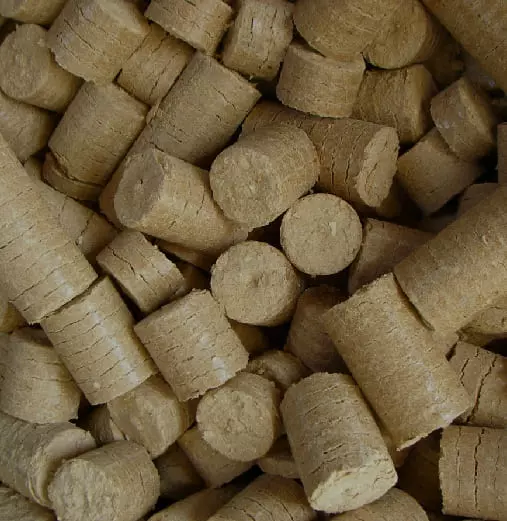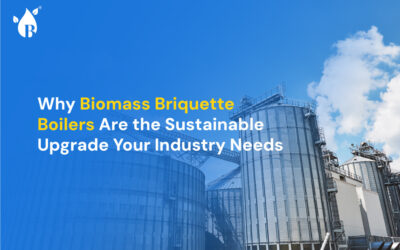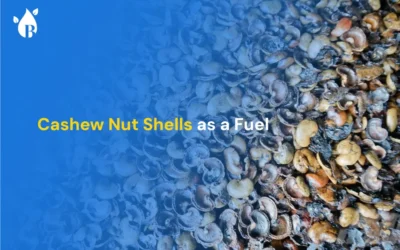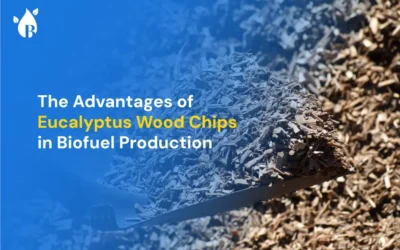
Biomass is a fuel developed from organic materials and residues like wood, crops, and agricultural wastes. Biofuels have evolved to be potential alternatives to non-renewable energy sources.
The blog presents some of the benefits of biomass briquettes and pellets over other fuels. If you have ever wondered about biomass, “Is it really a renewable source of energy?” read the blog to understand the scientific evidence and technical reasons for it.
What is Biomass briquettes?
Biomass briquettes refer to small blocks or bricks made of biomass, including sawdust, agricultural waste, and other plant residues. They serve as potential substitutes for coal, charcoal, and other fossil fuels. Biomass briquettes are predominantly made from rice husk, groundnut shell, sawdust, coffee husk, coir pith, cotton stalks, wooden biomass, agro residues, etc.
A lot of times, the agro residues and municipal wastes end up in landfills polluting the environment. Converting them into briquettes not only serves as fuel and helps reduce emissions, but they also help reduce landfills and waste accumulation.
Benefits of Briquettes & Pellets over other fuels
Using biomass briquettes and pellets over other fossil fuels offers the following benefits.
#1 Cheaper and economical
Biomass is very cheap when compared to traditional fuel sources like coal. Fossil fuel sourcing, extraction, and processing require heavy investments in oil drills, gas pipelines, etc. On the other hand, as biomass is produced from plant wastes and agricultural residues, they are less expensive, and so biomass briquettes are sold at lower prices. Biomass briquettes have the potential to serve as cooking and heating fuel in low-income countries and a cheaper substitute for fossil fuels in developing countries. This would help developed countries accelerate the process of achieving their Nationally Determined Contributions (NDCs). To know the exact biomass briquettes price per kg, visit https://buyofuel.com/
Unlike fossil fuels, biomass is completely renewable. The primary input source for biomass briquettes drives down to algae, sun, and plants, which regrow faster. So, there is a continuous supply of biomass materials. This is unlike fossil fuels like coal, oil, and charcoal, which are available in limited quantities.
The main component of biomass briquettes is the sawdust, wood residues, agricultural wastes, and other organic materials. They are readily available, and you can find them in loads almost anywhere and everywhere. This is advantageous over fossil fuels, whose availability is limited. Also, fossil fuels like oil and coal are available only in certain places with optimal environmental and climatic conditions. The availability of fossil fuels is mainly dependent on geographic conditions. In that case, biomass briquettes are advantageous as they are omnipresent and readily available.
#4 Smoke-free
Using briquettes as fuel creates no smoke, fly ash, or carbon particles. Because biomass briquettes are made from organic wastes and agricultural residues, they do not emit pollutive gases. The energy produced is clean and free of toxic chemicals and greenhouse gases. As biomass is produced from plant wastes, they only release the same amount of carbon absorbed that was a part of the photosynthesis process.
The ash produced from burning biomass briquettes contains plant ash which can be used as fertilizers to nurture and grow new plants. This cycle, from plant wastes to briquettes and biomass to again plant ash, enhances sustainability.
What are the advantages of the briquetting process?
Briquettes are made from plant wastes and agricultural remains. Normally, these wastes end up in a landfill. Studies show that processing solid waste has the ability to reduce landfill by 60% to 90%. So, the briquetting process helps reduce the volume of waste in the environment.
Briquetting process helps produce efficient fuel with high combustion efficiency and thermal value. Biomass briquettes can serve as efficient substitutes for fossil fuel energy sources.
Briquetting helps convert agricultural wastes and plant residues into usable sources of fuel. As they have the ability to substitute fossil fuel sources, they help reduce carbon emissions and tackle global warming.
Waste disposal and treatment remain a costly affair. As explained earlier, plant and agricultural wastes end up in landfills, as disposing of and treating them is expensive. Briquetting helps reduce the cost of waste disposal while also serving as a low-cost fuel option.
What is the greatest advantage of briquette over loose biomass burning?
Biomass and organic wastes in their raw form lack efficiency. Compressing them into biomass briquettes helps improve combustion efficiency. Briquettes produce more intense heat than burning loose, unpacked biomass. Lowering the moisture and increasing the biomass density during the briquette process increases the combustion efficiency of biomass briquettes.
Studies show that the biomass briquettes are 10 times lower in volume than the loose, unpacked ones. The latter is harder to pack and transport across long distances. The loading and unloading are also cumbersome and costly. Converting biomass into biomass briquettes increases the density, adding a uniform shape and size. This makes it easy to transport.
#3 Saves space
Biomass materials in their original form carry low density. They are shapeless and hard to store. When the density is increased during the briquetting process, biomass gets compressed and a proper shape. The briquettes are cylindrical, cubical, rectangular, or spherical. This makes the briquettes easy to store and transport.
Read this blog also: What is the composition of Biomass Briquettes?
What is the disadvantage of briquettes?
While there are several advantages to using biomass briquettes, their manufacturing requires expertise and investment in modern machines for sourcing, crushing, and drying.
Conclusion
The evolution of biomass briquettes is revolutionizing the fuel industry and setting new standards when it comes to emission reduction and sustainability. High combustion efficiency, low moisture content, environment friendliness, easiness to transport and storage, and the ability to reduce waste volume are some of the notable advantages of biomass briquettes.
If you are looking to buy or sell biomass briquettes in India, visit https://buyofuel.com/ . Buyofuel is one of the leading biomass briquette suppliers in Coimbatore, committed to the noble mission of creating a sustainable future With Biomass Briquettes. If you are looking for biomass prices in India, talk to our team.



